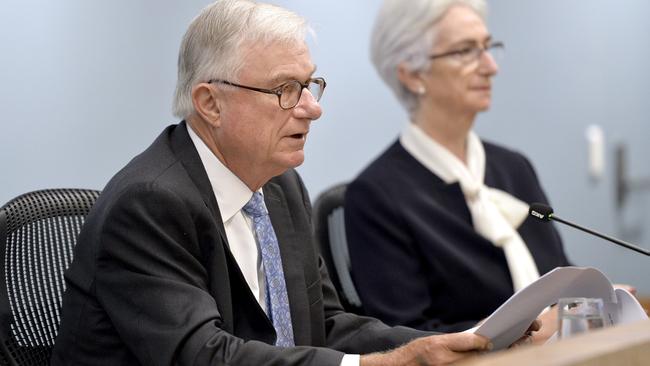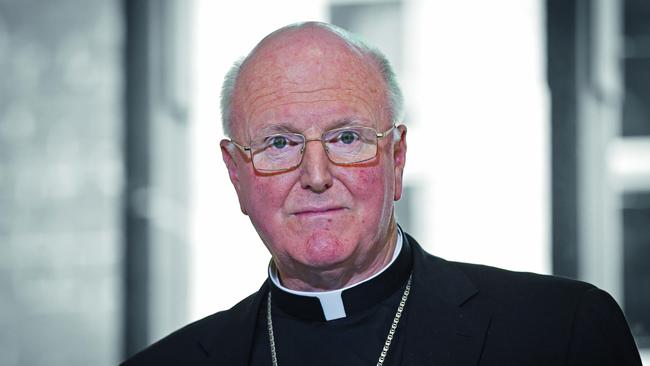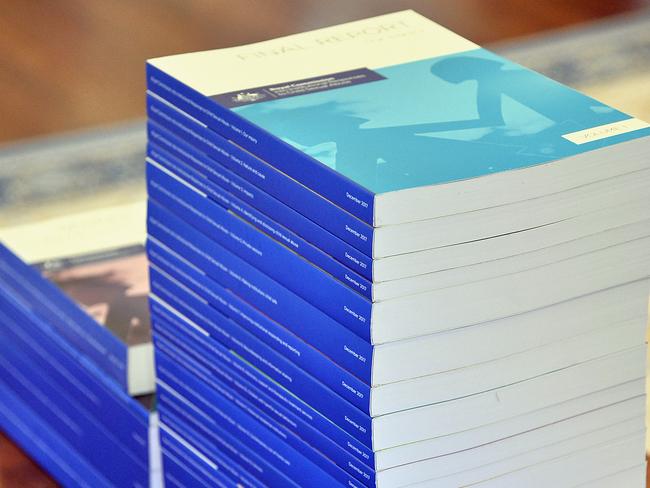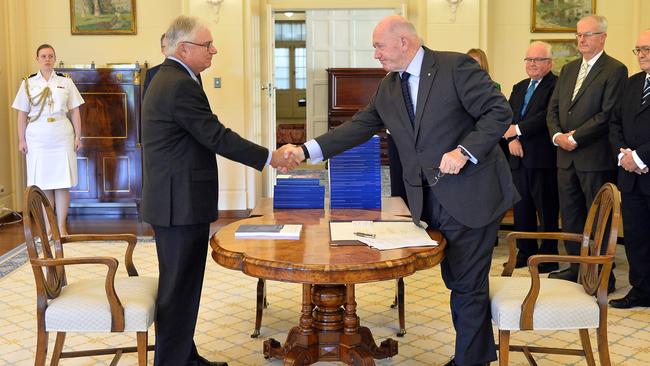Abuse royal commission: Vatican urged to change confession rules
Melbourne’s Catholic Archbishop says some priests can’t follow through with the lifestyle as sex abuse inquiry links celibacy vow to abuse.

Young priests must think hard about what a life of celibacy means and consider a career change if they’re not cut out for it, a prominent Catholic archbishop says.
The comments from Melbourne Archbishop Denis Hart come after a royal commission found compulsory celibacy for clergy members has been a contributing factor to child sexual abuse.
The child abuse royal commission’s final report on Friday recommended celibacy should be voluntary for the clergy to reduce the risk of harm to children. Archbishop Hart promised to pass on the suggestion to the Holy See in Rome, but pointed out the benefits of celibacy.
“There are real values in celibacy - it is walking with a group, with others, as Christ did,” he said.
“That being supported by prayer and by a relationship that is broader than a relationship of marriage.” But he conceded some priests agree to the lifestyle without the capacity to follow through with it.
“It’s a difficult thing and something that not everyone can live up to,” he told reporters in Melbourne.
“Some undertake celibacy without proper understanding and proper capacity.”
Archbishop Hart said it was crucial those training to join the priesthood knew what they were taking on, noting a need for more education in this area. “And if they can’t be really motivated, really sure and really helped, then it’s better that they not go forward,” he said.
The royal commission found celibacy can cause emotional isolation, loneliness and mental illness, and is a contributing factor to child abuse. “Based on research we conclude that there is an elevated risk of child sexual abuse where compulsorily celibate male clergy or religious have privileged access to children in certain types of Catholic institutions,” the report said.
‘KILLING CONFESSION NOT THE ANSWER’
The Catholic Archbishop of Sydney has ruled out considering any changes to the church practice of confession despite one of the recommendations made by the child abuse royal commission being that any information revealed that exposes abuse not be kept secret.
Archbishop Anthony Fisher said this afternoon questions about the strict privacy of confession were a “distraction” and would not help anyone avoid child sex abuse in the future.
“Killing off confession is not going to help anybody,” he said.
“This Catholic and Orthodox practice is always entirely confidential and I think any proposal to effectively stop the practice of confession in Australia would be a real hurt to all Catholics and Orthodox Christians and I don’t think would help any young person.
“If young people are to be kept safe, focusing on something like confession is just a distraction.”
Archbishop Fisher stressed while he had not read in detail the 17-volume final report by the Royal Commission into Institutional Responses to Child Sex Abuse, it will not “sit on any shelf”. “I will study the findings and recommendations carefully,” he said.
Another of the royal commission’s recommendations — that celibacy be voluntary in the clergy — will endure, Archbishop Fisher said.
“I think the debates about celibacy will go on however people respond to this issue,” he said. “We know very well that institutions who have celibate clergy and institutions that don’t have celibate clergy both face this problem ... It is an issue for everyone, celibate or not.”
He also apologised to those who had suffered abuse at the hands of Church personnel, and conceded he recognised that it had “damaged the credibility of the Church in the broader community”.

Archbishop Hart has expressed deep sorrow for the Church’s “shameful past” but distanced himself from several recommendations of the Royal Commission into child sexual abuse, which would rely on support from the Vatican.
Archbishop Hart has also ruled out breaking the “seal of confession” in the event an individual disclosed they were an abuser, and said the Holy See would be unlikely to adopt such a recommendation.
The Melbourne Archbishop and head of the Australian Catholic Bishops Conference welcomed the report but noted that many of the 180 recommendations would have a “significant impact on the way the Catholic Church operates in Australia.
“The release of the final report is the culmination of almost five years of intense examination of the way in which many different institutions including the Catholic Church have historically failed children,” he said.
“This is a shameful past, in which prevailing culture of secrecy and self protection led to unnecessary suffering for many victims and their families.
“Once again I reiterate on behalf of the bishops and religious leaders of the Catholic a church out unconditional apology for this suffering and a commitment to ensuring justice.”
Archbishop Hart said the Church was committed to considering all the recommendations and referring them on to the Holy See.
He said he personally believed in the importance of celibacy among the priesthood and would not break the seal of confession, even if presented with information about child abuse.
“I would refuse them absolution until they went to authorities ... there’s no standing back in practical terms,” he said.
“But the penalty for breaking the seal is excommunication — being thrown out of the Church. It’s very serious.”
The Archbishop said the Church would continue to push for a national redress scheme for victims and urged the state and territory governments to act to ensure it had nationwide coverage.”
The Commission was “satisfied” that the practice of confession contributed to the occurrence of child sexual abuse and to inadequate responses to abuse. It also said compulsory celibacy and vowed chastity had contributed to the occurrence of abuse.
New laws would place a duty on those in religious ministry to report abuse to child protection authorities, and remove an exemption from mandatory reporting laws where knowledge or suspicions of child sexual abuse are formed on the basis of information received in connection with religious confession.
It said the leadership of the Catholic Church had “failed the people of the Catholic Church in Australia, in particular its children”.
“The results of that failure have been catastrophic,” the Commission says.

Confession, celibacy in spotlight
The Vatican should be asked to change canon law to ensure that any information shared during confession that exposes child abuse is not required to be kept secret.
The reform is among a total of 409 recommendations made by the Royal Commission into Institutional Responses to Child Sexual Abuse, which handed down its final report today after a $350 million five-year inquiry.
All Catholic religious institutes in Australia have also been urged to implement measures to address the risks of harm to children, and the “potential psychological and sexual dysfunction” associated with celibacy.
The inquiry’s 17-volume report handed to the government today contains 189 new recommendations, aimed at protecting children from abuse. It contains almost 4000 stories from survivors of child sexual abuse.
The commission heard about child abuse in almost 1700 religious institutions. The abuse occurred in churches, presbyteries, rectories, confessionals, religious schools, orphanages and missions, and other settings. Sexual abuse was often accompanied by physical or emotional abuse.
Most victims were aged between 10 and 14 when the abuse first started.
The perpetrators included priests, religious brothers and sisters, ministers, church elders, teachers, youth group leaders and others.
The abuse within religious institutions was “particularly troubling”, because the institutions have a key role in children’s lives as providers of education, health and social welfare, and that perpetrators were among the people who “children and parents trusted the most and suspected the least”.
It said while “positive reforms” were underway, “there is still much progress to be made before the community can be confident that all religious institutions in Australia are as safe as possible for children”.
The report reveals that almost a third of survivors who contacted the Commission were abused in schools, about 14.5 per cent were abused while involved in religious activities, while about 36 per cent were sexually abused in pre-1990 children’s homes and other forms of out-of-home care.
More than half, or 58.6 per cent, were sexually abused in an institution managed by a religious organisation. Of those, the majority, or 61.8 per cent, was managed by the Catholic Church.
The Anglican Church has been urged to develop a national approach to the selection, screening and training of candidates for ordination, while the Commission has called on the Jehovah’s Witnesses to abandon its controversial rule which requires two witnesses in cases involving complaints of child sexual abuse.
Jewish institutions have been told they should ensure laws followed by some ultra-orthodox organisations against gossiping or speaking badly of others do not stop the reporting of allegations of child sexual abuse to police.

Survivors of child abuse have urged the Turnbull government to accept the report’s recommendations and deliver a long-awaited national redress scheme.
Federal Minister for Social Services Christian Porter said implementing the $4 billion national redress scheme for survivors was “immensely complicated” and the Turnbull government had been negotiating with the states and territories for many months.
“It’s my sense that we are on the verge of having the first states and territories opt in,” he said.
“We know for sure the Commonwealth will be in; we know for sure the Northern Territory and the ACT will be in, because we have indicated that we will compel if we have to.”
He said he was waiting for “formal decisions from the larger jurisdictions” -- NSW and Victoria had indicated they were likely to opt in, but had yet to decide formally.
The government was also waiting on the Catholic Church, the Anglican Church, the Salvation Army, and many other churches and charities to join the scheme.
“Now that that report is out, I think the time for offering up reasons to not do something has ended, and the time for showing that you will do something is upon us,” he said.
More than 4000 institutions were reported as places where abuse occurred, and children as young as seven reported recent abuse. So far, about 230 prosecutions have commenced.
The head of Catholic Religious Australia this morning said religious orders across Australia were committed to continuing the work of recent years to ensure a future in which the safety and protection of children and vulnerable adults is paramount.
Sister Ruth Durick OSU, President of Catholic Religious Australia, “acknowledged with gratitude” the courage of all survivors who shared their stories.
“We acknowledge the pain carried by so many and the collective and individual pain that abuse in our Church has caused to the people of Australia,” she said.
“We recognise the far-reaching damage that has been done, and seek to do all that we can to keep children safe in our organisations.
“We will be taking very seriously the Royal Commission’s report and, with the Australian Catholic Bishops’ Conference, have commissioned an initial assessment of its findings by the Truth, Justice and Healing Council. We expect the TJHC assessment to be completed early in 2018.”

Royal Commission chief executive Philip Reed said that through the work of the Royal Commission, the Australian public has learnt about the multiple and persistent failings of institutions to keep children safe, the cultures of secrecy and cover-up, and the devastating affects child sexual abuse can have on an individual’s life.
“The Final Report tells the story of institutional child sexual abuse in Australia, and provides recommendations to shape a safer future for children,” Mr Reed said.
“We have now completed our work. It’s up to governments and institutions to take the next steps and implement the Royal Commission’s recommendations.”
The Commission has also recommended new laws to ensure new national standards for children’s safety become mandatory for all institutions engaged in child related work.
An independent oversight body in each state and territory would be responsible for monitoring and enforcing the standards.
A new National Office for Child Safety would be set up in the Department of Prime Minister and Cabinet to lead the proposed national framework for child safety. This would become an independent statutory body within 18 months.




